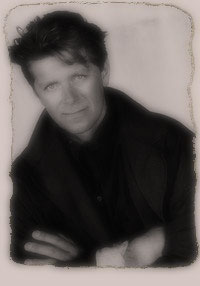 Farewell Peter ... Welcome Jason "When Peter left, he stayed with Warner Bros., " explains Jason Scheff. "I had just signed a song publishing deal, and Michael Ostin at Warner Bros. called over to my publisher and said, "Do you have any songs for Peter's solo album and/or someone to collaborate with him for the album?' They said, 'Yeah, we just signed this new kid.' So, they sent the demos of the first three songs that I'd brought in, and the story that I have always heard is that Michael heard the voice and said, 'Wait a minute, this could be the guy we're looking for to replace Peter in Chicago.' I didn't know this was going on. I just got a phone call one day saying, 'We have heard your tape, and we think that you could be the guy to replace Cetera in Chicago. It was a pretty amazing phone call to get, at 23 years old ." Scheff was being asked to join the band on the basis of his tenor singing voice. Though he is the son of the legendary bass player Jerry Scheff, who backed Elvis Presley and has played with countless other musicians, nobody seems to have made the connection to the instrumental hole that Cetera's departure also left. Howard Kaufman, the manager, asked me, 'What instrument do you play?' I said, 'I'm a bass player,' and be freaked out," Scheff recalls. "He said, 'Oh, my God! This sounds like a match made in heaven." Growing up in San Diego, Scheff didn't see much of his father, since his parents had divorced when he was young. But when he picked up an instrument, he could feel the connection. "Playing the base was very natural for me, so I knew that it was a gift that he had given me genetically, " he says. Scheff's mother is also a musician, and the two had a bond together when he was 14. As he went through his teens, Scheff played in local Top 40 bands, and his first break came when he was 19 and Peter Wolf (the record producer, not the ex-J. Geils Band singer), who would later produce Chicago, hired him for his band, which opened for the Rolling Stones in Vienna in 1982. Back in L.A., he continued to write songs and perform on recording session. But being asked to join Chicago was the biggest break of his short career. It was also, he says, "the last thing that I would have imagined." With Scheff in place, Chicago went into the studio with David Foster to make Chicago 18. The album emerged at the end of September 1986 as the band took to the road for a fall tour to introduce the new member. Other Related Story... The next Chicago-Foster project, Chicago 17, released in May 1984, became the band's greatest seller. Such hits as "Stay The Night," "Hard Habit To Break," "You're The Inspiration," and "Along Comes A Woman" propelled the album past the six million mark and reaffirmed Chicago's status as one of America's top bands. They once again played sold-out concerts in North America and Asia. "We had a great time playing the big time again," says Loughnane. "It was the second big wave. People would give their eye teeth for the first amount of success that we had in the '70s, and to be able to do it for the second time is a major milestone in the history of rock 'n' roll as well as our history. Not too many people have had this opportunity, and we had a lot of fun with it." But Chicago's renewed success presaged a new challenge when Peter Cetera, whose singing and songwriting on a series of romantic ballads had fuelled that popularity, decided to leave the group and launch a solo career after the summer 1985 tour. In an ironic twist, however, the beginning of his new solo act would lead to the successor who helped Chicago maintain and extend its success. By History of Chicago |